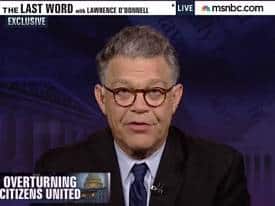Al Franken Misrepresents the Censorship Power Democrats Are Demanding
Jacob Sullum|Sep. 9, 2014 7:26 pm
MSNBC During today’s debate about SJR 19, a proposed constitutional amendment that would restrict freedom of speech in the name of “democratic self-government and political equality,” Sen. Al Franken (D-Minn.)claimed the measure would merely “restore the law to what it was before Citizens Unitedwas decided.” Not so. True, the amendment would allow Congress to re-enact the speech restrictions overturned in that case, which barred unions and corporations, including nonprofit advocacy groups, from criticizing federal politicians on TV or radio close to an election. But as I noted yesterday, the amendment would go a lot further than that.
The amendment would allow Congress and state legislatures to “regulate and set reasonable limits on the raising and spending of money by candidates and others to influence elections.” That means it would overturn Buckley v. Valeo, the 1976 decision in which the Supreme Court upheld limits on donations to candidates but rejected limits on spending by candidates, reasoning that such caps amount to restrictions on speech, since communicating with a mass audience requires money.
The amendment that Franken and at least 48 of his colleagues favor also would allow legislators to impose limits on independent spending by individuals, which the Court has never upheld. Section 2 says legislators “may distinguish between natural persons and corporations or other artificial entities created by law,” but there is no requirement that they do so. Congress might decide, in the interest of “political equality,” that opinionated billionaires such as George Soros, Michael Bloomberg, Sheldon Adelson, and the Koch Brothers should shut the hell up and let other people have a turn. It could even ban political ads featuring celebrities, on the theory that they have an unwarranted influence on voters.
Given the breadth of this authority, the examples of possible censorship listed by Sen. Ted Cruz (R-Texas) in a recent Wall Street Journal op-ed piece—including bans on the distribution of voter guides by the National Rifle Association, on pro-life or pro-choice advocacy close to an election, on get-out-the-vote efforts by churches or unions, and on documentaries critical of politicians running for office—are not at all fanciful. In fact, that last example is exactly what Citizens United involved. Under this amendment, such a documentary could be squelched even if it were the work of an independent filmmaker unaffiliated with any group organized as a corporation.
https://reason.com/blog/2014/09/09/al-franken-misrepresents-the-censorship

